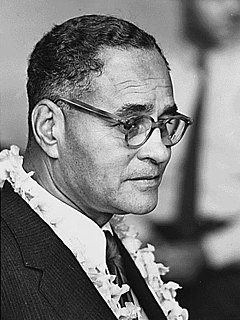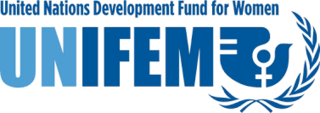
The United Nations (UN) is an intergovernmental organization aiming to maintain international peace and security, develop friendly relations among nations, achieve international cooperation, and be a centre for harmonizing the actions of nations. It is the world's largest and most familiar international organization. The UN is headquartered on international territory in New York City, and has other main offices in Geneva, Nairobi, Vienna, and The Hague.

Peacekeeping comprises activities intended to create conditions that favour lasting peace. Research generally finds that peacekeeping reduces civilian and battlefield deaths, as well as reduces the risk of renewed warfare.

Ralph Johnson Bunche was an American political scientist, diplomat, and leading actor in the mid-20th-century decolonization process and US civil rights movement, who received the 1950 Nobel Peace Prize for his late 1940s mediation in Israel. Among black Nobel laureates he is the first African American and first person of African descent to be awarded a Nobel Prize. He was involved in the formation and administration of the United Nations and played a major role in both the decolonization process and numerous peacekeeping operations sponsored by the UN. In 1963, he was awarded the Presidential Medal of Freedom by President John F. Kennedy. At the UN, Bunche gained such fame that Ebony magazine proclaimed him perhaps the most influential African American of the first half of the 20th century and "[f]or nearly a decade, he was the most celebrated African American of his time both [in the US] and abroad."

The history of the United Nations as an international organization has its origins in World War II. Since then its aims and activities have expanded to make it the archetypal international body in the early 21st century.
Canada was a founding member of the United Nations, and was an original signatory of the Declaration by United Nations. At the signing of the Declaration by United Nations, Canada was one of four Dominions of the British Empire present, alongside Australia, New Zealand, and the Union of South Africa. In 1945, Canada was present at the United Nations Conference on International Organization and signed the Charter of the United Nations. McGill University professor John Peters Humphrey was the principal author of the first draft of the Universal Declaration of Human Rights.

The United Nations Development Fund for Women was established in December 1976 originally as the Voluntary Fund for the United Nations Decade for Women in the International Women's Year. Its first director was Margaret C. Snyder. UNIFEM provided financial and technical assistance to innovative programmes and strategies that promoted women's human rights, political participation and economic security. Since 1976 it supported women's empowerment and gender equality through its programme offices and links with women's organizations in the major regions of the world. Its work on gender responsive budgets began in 1996 in Southern Africa and expanded to include East Africa, Southeast Asia, South Asia, Central America and the Andean region. It worked to increase awareness throughout the UN system of gender responsive budgets as a tool to strengthen economic governance in all countries. In 2011, UNIFEM merged with some other smaller entities to become UN Women.
United Nations Security Council Resolution 1325 (S/RES/1325), on women, peace, and security, was adopted unanimously by the UN Security Council on 31 October 2000, after recalling resolutions 1261 (1999), 1265 (1999), 1296 (2000), and 1314 (2000). The resolution acknowledged the disproportionate and unique impact of armed conflict on women and girls. It calls for the adoption of a gender perspective to consider the special needs of women and girls during conflict, repatriation and resettlement, rehabilitation, reintegration, and post-conflict reconstruction.

The Department of Peace Operations (DPO) is a department of the United Nations charged with the planning, preparation, management and direction of UN peacekeeping operations. Previously known as the Department for Peacekeeping Operations (DPKO), it was created on 1 January 2019 as part of a restructuring of the UN's peace and security apparatus. The DPO retains the core functions and responsibilities of its predecessor, with a greater emphasis on cohesion, integrating different resources and knowledge, and promoting human rights.

Prince Zeid Ra'ad Zeid Al Hussein is a former Jordanian diplomat who is the Perry World House Professor of the Practice of Law and Human Rights at the University of Pennsylvania. He is also the president and CEO of the International Peace Institute. He also served as United Nations High Commissioner for Human Rights from 2014 to 2018. He played a central role in the establishment of the International Criminal Court, and was elected the first president of the Assembly of State Parties of the International Criminal Court in September 2002. He also served as a political affairs officer in UNPROFOR in the former Yugoslavia from 1994 to 1996.

The United Nations Department of Political and Peacebuilding Affairs (DPPA) is a department of the Secretariat of the United Nations (UN) with responsibility for monitoring and assessing global political developments and advising and assisting the UN Secretary General and his envoys in the peaceful prevention and resolution of conflict around the world. The department manages field-based political missions in Africa, Central Asia, and the Middle East, and has been increasing its professional capacities in conflict mediation and preventive diplomacy. DPPA also oversees UN electoral assistance to Member States of the organization. Established in 1992, the department's responsibilities also include providing secretariat support to the UN Security Council and two standing committees created by the General Assembly concerning the Rights of the Palestinian People and Decolonization. DPPA is based at the UN Headquarters in New York City.
The International Peace Institute is an independent non-profit lobby group based in New York. The Institute has regional offices in Europe, and in the Middle East.

Mildred Robbins Leet was an American entrepreneur and philanthropist. She was a co-founder and Chair Emerita of the Board of Directors of Trickle Up, a New York-based international non-governmental organization dedicated to alleviating poverty.
The United Nations Peacekeeping efforts began in 1948. Its first activity was in the Middle East to observe and maintain the ceasefire during the 1948 Arab–Israeli War. Since then, United Nations peacekeepers have taken part in a total of 72 missions around the globe, 14 of which continue today. The peacekeeping force as a whole received the Nobel Peace Prize in 1988.

International Women's Year (IWY) was the name given to 1975 by the United Nations. Since that year March 8 has been celebrated as International Women's Day, and the United Nations Decade for Women, from 1976 to 1985, was also established.

New Zealand is a founding member of the United Nations, having taken part in 1945 in the United Nations Conference on International Organization in San Francisco.

Dr. Noeleen Heyzer is a Singaporean social scientist who was Under-Secretary-General of the United Nations and Executive Secretary of the United Nations Economic and Social Commission for Asia and the Pacific (ESCAP). She was the first woman to hold the latter position since ESCAP's founding in 1947. She is currently Lee Kong Chian Distinguished Fellow at the SMU School of Social Sciences. She was also the United Nations Secretary-General's Special Adviser for Timor-Leste, working to support peace-building, state-building, and sustainable development. In 2005, she was nominated for the Nobel Peace Prize in recognition of her struggle to improve the lives of women, while always promoting peace and justice.
India was among the original members of the United Nations that signed the Declaration by United Nations at Washington, D.C. on 1 January 1942 and also participated in the United Nations Conference on International Organization at San Francisco from 25 April to 26 June 1945. As a founding member of the United Nations, India strongly supports the purposes and principles of the UN and has made significant contributions in implementing the goals of the Charter, and the evolution of the UN's specialised programmes and agencies.

The United Nations Entity for Gender Equality and the Empowerment of Women, also known as UN Women, is a United Nations entity working for gender equality and the empowerment of women. UN Women advocates for the rights of women and girls and LGBTIQ+ rights, and focuses on a wide array of issues, including violence against women and violence against LGBTIQ+ people.
Sally ("Salwa") Shatila Kader is the co-founder and president of the International Federation for Peace & Sustainable Development, a bipartisan, non-profit and non-governmental organization, which has seventeen chapters around the world including its headquarters in New York City. Kader is a peace activist and currently leads IFPSD programs and events at the United Nations Headquarters in New York City and around the world. She has been recognized by world leaders and organizations for her contributions towards peace.
Bangladesh and the United Nations have a strong relationship. Bangladesh is one of the largest troop contributing countries in the world.










